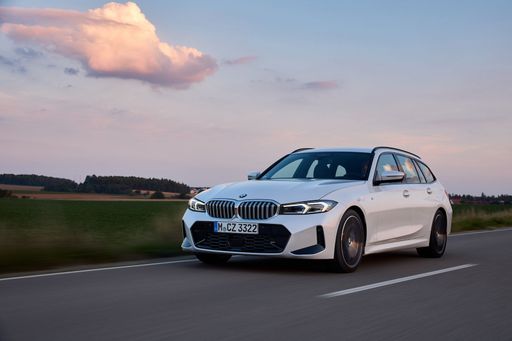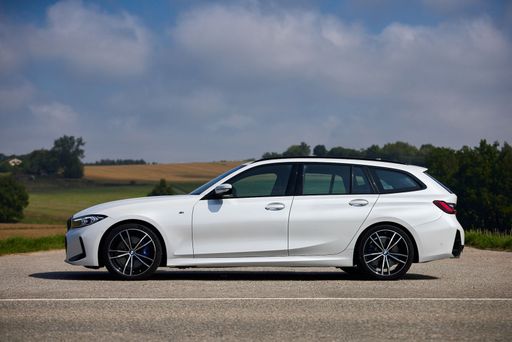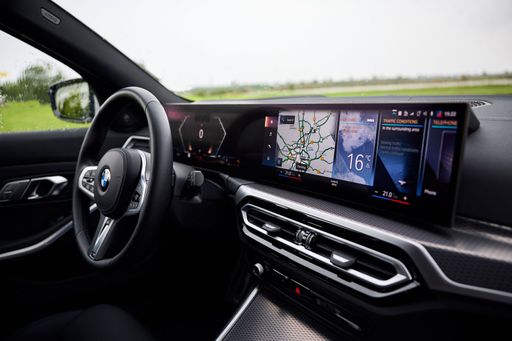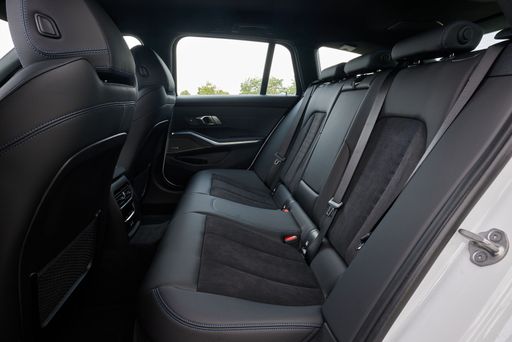BMW 3 Series Touring vs Hyundai Tucson - Differences and prices compared
Compare performance (550 HP vs 288 HP), boot space and price (41100 £ vs 20900 £) at a glance. Find out which car is the better choice for you – BMW 3 Series Touring or Hyundai Tucson?
Costs and Efficiency:
Price and efficiency are often the first things buyers look at. Here it becomes clear which model has the long-term edge – whether at the pump, the plug, or in purchase price.
Hyundai Tucson has a clearly advantage in terms of price – it starts at 20900 £, while the BMW 3 Series Touring costs 41100 £. That’s a price difference of around 20160 £.
Fuel consumption also shows a difference: BMW 3 Series Touring manages with 2.50 L and is therefore slight more efficient than the Hyundai Tucson with 2.70 L. The difference is about 0.20 L per 100 km.
As for range, the BMW 3 Series Touring performs noticeable better – achieving up to 97 km, about 27 km more than the Hyundai Tucson.
Engine and Performance:
Under the bonnet, it becomes clear which model is tuned for sportiness and which one takes the lead when you hit the accelerator.
When it comes to engine power, the BMW 3 Series Touring has a convincingly edge – offering 550 HP compared to 288 HP. That’s roughly 262 HP more horsepower.
In acceleration from 0 to 100 km/h, the BMW 3 Series Touring is decisively quicker – completing the sprint in 3.50 s, while the Hyundai Tucson takes 7.50 s. That’s about 4 s faster.
In terms of top speed, the BMW 3 Series Touring performs a bit better – reaching 250 km/h, while the Hyundai Tucson tops out at 204 km/h. The difference is around 46 km/h.
There’s also a difference in torque: BMW 3 Series Touring pulls significantly stronger with 700 Nm compared to 379 Nm. That’s about 321 Nm difference.
Space and Everyday Use:
Cabin size, boot volume and payload all play a role in everyday practicality. Here, comfort and flexibility make the difference.
Both vehicles offer seating for 5 people.
In curb weight, Hyundai Tucson is barely noticeable lighter – 1542 kg compared to 1650 kg. The difference is around 108 kg.
In terms of boot space, the Hyundai Tucson offers somewhat more room – 620 L compared to 500 L. That’s a difference of about 120 L.
In maximum load capacity, the Hyundai Tucson performs a bit better – up to 1799 L, which is about 289 L more than the BMW 3 Series Touring.
When it comes to payload, Hyundai Tucson barely noticeable takes the win – 545 kg compared to 520 kg. That’s a difference of about 25 kg.
Who comes out on top?
Overall, the BMW 3 Series Touring shows itself to be dominates this comparison and secures the title of DriveDuel Champion.
It convinces with the more balanced overall package and proves to be the more versatile choice for everyday use.

BMW 3 Series Touring
Costs and Consumption
View detailed analysis
Engine and Performance
View detailed analysis
Dimensions and Body
View detailed analysis
BMW 3 Series Touring
The BMW 3 Series Touring blends sporting poise with everyday practicality, wrapping sharp handling and a premium cabin into a wagon that actually makes errands feel enjoyable. It’s the kind of car that hides a family-hauler’s sense of duty beneath a driver's-car attitude — useful, classy, and just cheeky enough to make you smile on the open road.
details




Hyundai Tucson
Hyundai Tucson marries bold, sculpted looks with a clever, roomy cabin that feels smarter than its price tag suggests. It's composed on the road, easy to live with day-to-day, and a sensible choice for buyers who want SUV style without the showroom theatrics.
details





|

|
|
|
|
Costs and Consumption |
|
|---|---|
|
Price
41100 - 131100 £
|
Price
20900 - 47900 £
|
|
Consumption L/100km
2.5 - 10.5 L
|
Consumption L/100km
2.7 - 7.6 L
|
|
Consumption kWh/100km
-
|
Consumption kWh/100km
-
|
|
Electric Range
91 - 97 km
|
Electric Range
63 - 70 km
|
|
Battery Capacity
19.50 kWh
|
Battery Capacity
-
|
|
co2
57 - 238 g/km
|
co2
62 - 172 g/km
|
|
Fuel tank capacity
40 - 59 L
|
Fuel tank capacity
52 - 54 L
|
Dimensions and Body |
|
|---|---|
|
Body Type
Estate
|
Body Type
SUV
|
|
Seats
5
|
Seats
5
|
|
Doors
5
|
Doors
5
|
|
Curb weight
1650 - 2025 kg
|
Curb weight
1542 - 1893 kg
|
|
Trunk capacity
410 - 500 L
|
Trunk capacity
546 - 620 L
|
|
Length
4713 - 4714 mm
|
Length
4525 - 4535 mm
|
|
Width
1827 - 1918 mm
|
Width
1865 mm
|
|
Height
1440 - 1448 mm
|
Height
1650 mm
|
|
Max trunk capacity
1420 - 1510 L
|
Max trunk capacity
1795 - 1799 L
|
|
Payload
405 - 520 kg
|
Payload
518 - 545 kg
|
Engine and Performance |
|
|---|---|
|
Engine Type
Diesel MHEV, Petrol, Petrol MHEV, Plugin Hybrid
|
Engine Type
Petrol, Full Hybrid, Plugin Hybrid, Diesel MHEV
|
|
Transmission
Automatic
|
Transmission
Manuel, Automatic
|
|
Transmission Detail
Automatic Gearbox
|
Transmission Detail
Manual Gearbox, Dual-Clutch Automatic, Automatic Gearbox
|
|
Drive Type
Rear-Wheel Drive, All-Wheel Drive
|
Drive Type
Front-Wheel Drive, All-Wheel Drive
|
|
Power HP
150 - 550 HP
|
Power HP
136 - 288 HP
|
|
Acceleration 0-100km/h
3.5 - 8.8 s
|
Acceleration 0-100km/h
7.5 - 11.6 s
|
|
Max Speed
213 - 250 km/h
|
Max Speed
196 - 204 km/h
|
|
Torque
250 - 700 Nm
|
Torque
250 - 379 Nm
|
|
Number of Cylinders
4 - 6
|
Number of Cylinders
4
|
|
Power kW
110 - 405 kW
|
Power kW
100 - 212 kW
|
|
Engine capacity
1995 - 2998 cm3
|
Engine capacity
1598 cm3
|
General |
|
|---|---|
|
Model Year
2024 - 2025
|
Model Year
2025
|
|
CO2 Efficiency Class
D, E, F, G, B
|
CO2 Efficiency Class
F, D, E, B
|
|
Brand
BMW
|
Brand
Hyundai
|
Is the BMW 3 Series Touring offered with different drivetrains?
The BMW 3 Series Touring is offered with Rear-Wheel Drive or All-Wheel Drive.
The prices and data displayed are estimates based on German list prices and may vary by country. This information is not legally binding.
